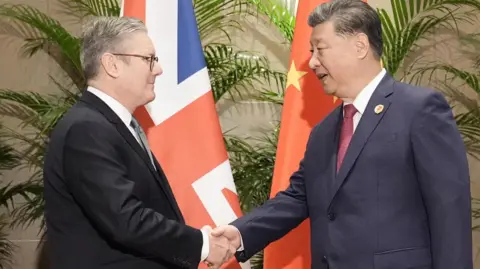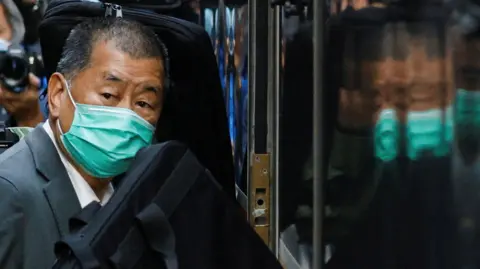We want 'strong' UK-China relationship, says Starmer
 Reuters
ReutersSir Keir Starmer has met President Xi Jinping at the G20 summit, and emphasised the importance of a "strong UK-China relationship" for both countries.
The meeting was the first time a UK prime minister has met the Chinese president in person since 2018, following a recent souring in relations.
Sir Keir raised the case of the jailed Hong Kong pro-democracy activist, Jimmy Lai, saying he was concerned about reports of a "deterioration" in his health.
The PM also signalled a desire for greater business co-operation, particularly on "areas of mutual cooperation" such as international stability, climate change and economic growth.
Sir Keir met President Xi on the fringes of the G20 summit in Rio de Janeiro, Brazil and, speaking at the start of the meeting, said: "We want our relations to be consistent, durable, respectful, as we have agreed, avoid surprises where possible."
He added: "The UK will be a predictable, consistent, sovereign actor committed to the rule of law."
Speaking through a translator, Xi told Sir Keir that the two countries should commit to mutual respect and openness, saying: "China and the UK have broad space for co-operation across various domains, including trade, investment, clean energy, financial services, healthcare and improving our peoples' well-being."
A read-out of the closed door meeting said the PM set out the leaders' shared responsibility to work together in pursuit of global stability, economic co-operation and trade, and efforts to move away from fossil fuels to renewables.
Climate change was a focus for the PM, and a Downing Street spokesperson said the PM wants China's support on global efforts, particularly in light of President-elect Trump's expected roll back of green policies.
However, Sir Keir also stressed his government's approach would "always be rooted in the national interests of the UK, but that we would be a predictable and pragmatic partner" to China.
With China's military support for Russia's war in Ukraine having prompted criticism from the UK and other Western countries, the PM also said he wanted to "engage honestly and frankly" on areas of disagreement, including on Hong Kong, human rights and Russia’s war in Ukraine.
Their first meeting follows an initial phone conversation in August after Labour's election victory and Sir Keir has now proposed a full bilateral meeting in Beijing or London.
The pair also agreed Chancellor Rachel Reeves should visit Beijing next year to discuss economic and financial cooperation with her counterpart, Vice Premier He Lifeng.
The Conservative's shadow foreign secretary Priti Patel said: “Britain's standing on the world stage risks being weakened if the prime minister does not robustly defend our national interest."
She said constructive dialogue was important but that Sir Keir "should have been stronger in raising our concerns over human rights, the repressive nature of the national security laws imposed on Hong Kong, and the security, safety and wellbeing of British nationals, like Jimmy Lai, who should be freed from custody".
"Starmer must set out, as part of his supposed reset, what assurances he received from President Xi on the UK’s areas of concern.”
Before the meeting in Brazil, the prime minister said it was important to engage with economies like China - and Foreign Secretary David Lammy held talks with his Chinese counterpart Wang Yi, as well as Vice Premier Ding Xuexiang, in Beijing last month.
The last British prime minister to meet President Xi was Theresa May, who hailed a "golden era" for UK-China relations during her 2018 visit to the country.
But since then there have been tensions over issues including China's treatment of the Uyghur minority group in Xinjiang and pro-democracy activists in Hong Kong.
Last year, then-Conservative Prime Minister Rishi Sunak said China was "the biggest state-based threat to our economic security".
But like the current government, he also said it was necessary to engage with China on issues like climate change and the global economy.
Dr Yu Jie, a China expert from the Chatham House international think tank, said the G20 meeting was "critical" for UK-China relations to thaw after a six-year freeze - and suggested there could be a trade deal in sight, despite significant diplomatic tensions.
"Judging from the readout given by both sides, the tone of the conversation seemed to be positive," said Dr Yu.
"But when they came to specifics it seems on the thorny issues they have not really reached any agreement at all."
Dr Yu warned both sides' efforts could still be overshadowed by pressure from the US.
"That's something quite difficult for the British government, if the US is going to be adding extra pressure for the UK to be in line with the US on China policy," she said, describing how she expected the US policy towards China to be "hawkish" under Trump.
 Reuters
ReutersSpeaking to reporters on his way to the summit in Rio de Janeiro, Sir Keir also said "shoring up support for Ukraine" was top of his agenda.
Before the meeting, Downing Street said the prime minister will urge other G20 nations to step up their support for Ukraine or face "unfathomable consequences" if Russia is allowed to be victorious.
The summit follows large-scale missile and drone attacks by Russia across Ukraine over the weekend, and will take place as the conflict approaches its 1,000th day.
And it comes amid reports that the US has authorised the use of long-range missiles it supplies to Ukraine to strike Russia.
The weapons have so far only been used by Kyiv on Russian-occupied targets within its own territory.
The UK has also supplied Ukraine with its Storm Shadow missiles and defence officials and ministers have been making the case for Kyiv to be permitted to use them to hit targets inside Russia. But they were not willing to act alone - and had been waiting for the White House to change its mind.
Sir Keir said he was "not going to get into operational details" with regards to missiles in Ukraine.
Sir Keir is holding talks with other G20 leaders, representing 19 of the world’s largest economies and the African Union and the European Union.
The summit is overshadowed by the absence of President-elect Donald Trump.
Trump has called for allies to take a more aggressive approach towards China and may trigger a global trade war if he imposes a promised 60% tariff on Chinese goods entering the US.
This summit will provide world leaders a first chance to compare notes and prepare for Trump's upcoming return to the White House.

Sign up for our Politics Essential newsletter to read top political analysis, gain insight from across the UK and stay up to speed with the big moments. It’ll be delivered straight to your inbox every weekday.
